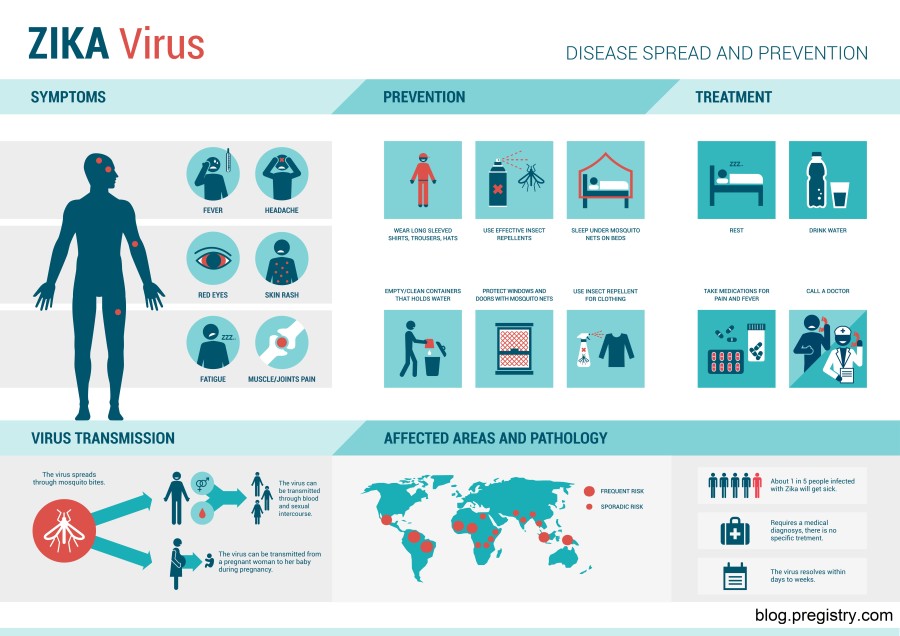I recently returned from a trip to Florida. Friends who live there told me that they had friends or relatives who had cancelled visits due to fear of the Zika virus. In case you don’t watch the news, Zika is a virus spread by mosquitoes that has become common in Brazil. Mosquito viruses are extremely common in Brazil, but Zika is a new player and it may be coming north.
The virus itself is not new. It was first described in 1952. For many years, the only significant outbreak was in 2007, on a small island in the Western Pacific Ocean, called Yap. Infectious disease experts were not much concerned about Zika because it was so rare and it only caused mild, flu-like symptoms. They are concerned now.
What Changed?
As far as we know, Zika is only spread by a family of mosquitoes called Aedes. If someone has the virus and is bitten by one of these mosquitoes, the mosquito becomes infected and spreads the virus to other people it bites. The mosquitoes never travel more than about 100 yards in a lifetime, but people do travel. People have now spread Zika into Africa, Asia, the Pacific and South America. That’s one big change.
The other big change is a possible link between Zika in pregnant women and a scary birth defect called microcephaly. As Zika infections have increased in Brazil, so have reports of microcephaly. Microcephaly is a birth defect that causes a baby’s head to be too small. It will take about another year of case-control studies to know if Zika really causes this birth defect, but the evidence is serious enough that some Brazilian doctors are urging women not to get pregnant until we know more.
Who Is in Danger?
If you are or may be pregnant, you should forget about traveling to Brazil for the Olympics, but you can go see your parents in Florida. As of now, there have been no reports of mosquitoes carrying Zika in the United States. Nobody can say how far north the virus will spread, but the history of dengue fever may be a good predictor of what will happen.
Dengue is transmitted by the same Aedes mosquitoes as Zika. Even though these mosquitoes live in southern and eastern areas of America, dengue has never been common here. Despite being extremely common in Brazil and some significant outbreaks in Puerto Rico, Dengue has been almost nonexistent in continental United States in the past 100 years. The probable reasons are less mosquitoes, more screens, more indoor living, and air conditioning.
Current Guidelines
Right now there is a lot about Zika that we just don’t know. Zika is a moving target, so guidelines are changing. Here are the basics:
- Avoid travel to areas where Zika is active if you are pregnant or may become pregnant. To get the latest travel advisory on areas to avoid, check this CDC website: http://wwwnc.cdc.gov/travel/notices.
- If you have travelled or live in an area where Zika is active, and you are or may be pregnant, talk to your doctor. Symptoms of Zika include fever, rash, headache, and joint pain. But most people have Zika without any symptoms. Your doctor may recommend doing a blood test to see if you have been infected. If you are pregnant, you may have more frequent ultrasounds to make sure your baby is developing normally.
If you have had Zika in the past, your probably have immunity to it and you won’t get it again. There is no evidence that future pregnancies would be effected by a past Zika infection. There is no medication to treat Zika. A vaccine for prevention is still years away.
You may have heard some recent reports about Zika being spread through sexual contact or through kissing. Although person-to-person spreads is possible, it is extremely rare. If you are or may be pregnant you should avoid having unprotected sex with anyone who has recently been in an area where Zika is active for about 3 weeks.
Is Zika the next Ebola? Probably not. Even Ebola was not the next Ebola. That fear has passed. But don’t expect the media to resist drumming up fear over Zika. Republicans may blame Obama. Democrats may blame global warming. Take a deep breath. It is probably not a real threat to your baby, as long as you don’t live or travel to an area where Zika is active.


